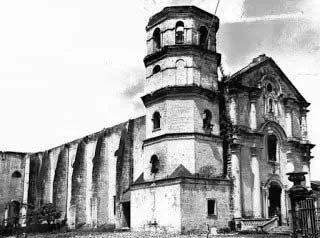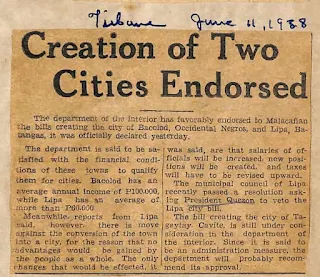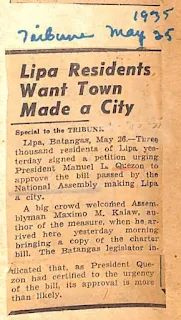When the Municipal Council of Lipa Objected to the Town Becoming a City
[In this article: Batangas Province, Lipa City Batangas, Republic Act Number 162 series of 1947, Lipa City Government, Lipa Municipal Council, The Tribune Newspaper Philippines, President Manuel Quezon]
By virtue of Republic Act No. 162 signed into law on 20 June 19471 by then-Philippine President Manuel Roxas, the erstwhile Municipality of Lipa became the Province of Batangas’ first city, 22 years ahead even of the province’s capital city of Batangas2.
In 1887, by virtue of its outstanding income primarily derived from its thriving coffee production, the title of “Villa3” was already granted by the Spanish Royal Crown to the pueblo of Lipa, something which meant that it was a direct estate of the crown or “a small settlement or city with certain rights to self-government4.”
The title was rescinded in 1895 as the coffee industry in Lipa quickly declined because of a fungus infestation5; and not that it really did anyone any good. In his autobiography, the famed Lipeño Teodoro M. Kalaw noted that no less than Jose Rizal opposed the conversion of Lipa to a Villa “because such a conversion did not bring with it any new rights to the masses6.”
READ: “The Glory of 19th Century Villa de Lipa as Described by a Spanish Historian”
An article in the 11 June 1938 edition of The Tribune Newspaper noted that the Department of the Interior had already endorsed to Malacañan bills creating the cities of Bacolod in Negros Occidental and Lipa in Batangas. Lipa, with an average annual income of more than ₱60,000, satisfied the financial condition necessary for it to become a town.
However, the same report stated that no less than Lipa’s own Municipal Council opposed the conversion and even passed a resolution asking Philippine Commonwealth President Manuel L. Quezon to oppose the bill. Below is the full text of the article:
The Department of the Interior has favorably endorsed to Malacañan the bills creating the cities of Bacolod, Occidental Negros, and Lipa, Batangas, it was officially declared yesterday.
The department is said to be satisfied with the financial conditions of these two towns to qualify them for cities. Bacolod has an average annual income of ₱100,000, while Lipa has an average of more than ₱60,000.
Meanwhile, reports from Lipa said, however, there is [a] move against the conversion of the town into a city, for the reason that no advantages would be gained by the people as a whole. The only changes that would be effected, it was said, are that salaries of officials will be increased, new positions will be created, and taxes will have to be revised upward.
The municipal council of Lipa recently passed a resolution asking President Quezon to veto the Lipa city bill.
The bill creating the city of Tagaytay, Cavite is still under consideration in the department of the interior. Since it is said to be an administration measure, the department will probably recommend its approval.
Lipa Residents Want Town Made a city
Lipa, Batangas, May 26. – Three thousand residents of Lipa yesterday signed a petition urging President Manuel L. Quezon to approve the bill passed by the National Assembly making Lipa a city.
A big crowd welcomed Assemblyman Maximo M. Kalaw, author of the measure, when he arrived here yesterday morning bringing a copy of the charter bill. The Batangas legislator indicated that, as President Quezon had certified to the urgency of the bill, its approval is more than likely.
2 “Batangas City,” Wikipedia.
3 “Demythologizing the History of Coffee in Lipa, Batangas in the XIX Century,” a dissertation written by Maria Rita Isabel Santos Castro, 2003.
4 “Compilation of Spanish Colonial Terms and Document Related Phrases,” online at SomosPrimos.com.
5 Castro, op. cit.
6 “The Decline of Lipa,” by Teodoro M. Kalaw, Translated from Spanish by Maria Kalaw Katigbak, published October 1938 in the Philippine Magazine, online at the Internet Archive.
7 “Philippine Press Clippings Volume II (1934B-1935),” online at the Internet Archive.



